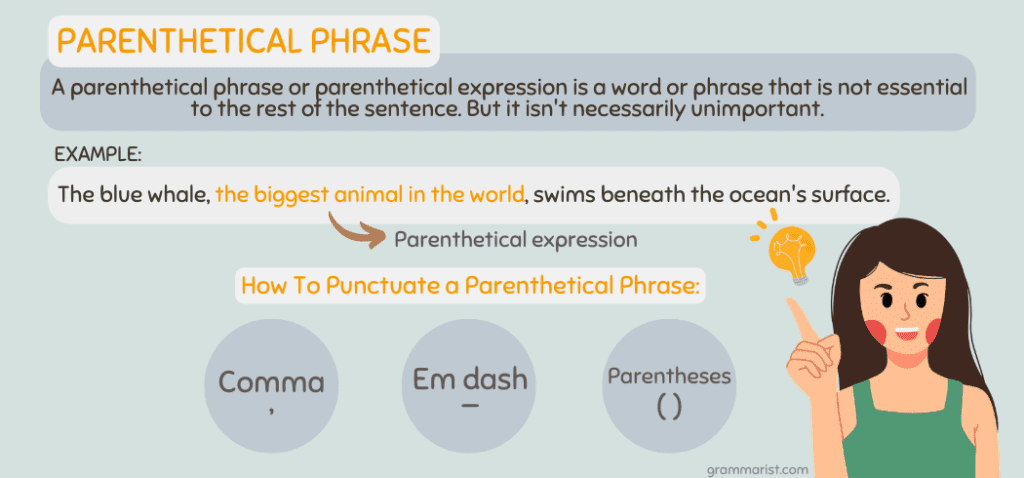Do you want to add more information to your sentence without ruining its flow and framing? If you answered yes, then you should learn how to use parentheticals. Don’t worry, I’ve got everything you need to know to learn it in a flash. A parenthetical word or phrase is added to a sentence without changing its grammatical structure.
I’ll discuss the definition and correct usage of parenthetical phrases in English grammar below. And you’ll discover their different types and the appropriate punctuation marks to use with them.
What Is a Parenthetical Phrase?

A parenthetical phrase or parenthetical expression is a word or phrase that is not essential to the rest of the sentence, but it isn’t necessarily unimportant. It only means it doesn’t affect the sentence’s grammatical structure.
Below is a parenthetical phrase example.
- The blue whale, the biggest animal in the world, swims beneath the ocean’s surface.
The parenthetical expression in this sentence is “the biggest animal in the world.” If you try removing it, the sentence’s meaning does not change.
How to Punctuate a Parenthetical Phrase
Parenthetical words and phrases can easily be identified by their punctuation marks. But aside from the correct use of parentheses, how do you punctuate a parenthetical phrase?
The most common rule when using parenthetical phrases is to use the correct punctuation mark: commas, em dash, or a pair of parentheses. Look at how the entire sentence uses different punctuation marks.
- The employee, hoping to go home early, rushed her tasks.
- The employee—hoping to go home early—rushed her tasks.
- The employee (hoping to go home early) rushed her tasks.
Notice how there is always a pair of punctuation marks—an opening and a closing mark.
The most usual form of punctuation is the comma. But you can set off a parenthetical phrase from the sentence by an em dash or parentheses to keep the sentence intact when you remove the phrase. For example:
- The employee, hoping to get home early, rushed her tasks.
- The employee rushed her tasks.
- Some types of food—such as candies and potatoes—can trigger diabetes.
- Some types of food can trigger diabetes.
Can a Parenthetical Phrase Be at the End of a Sentence?
Yes, you can add a parenthetical phrase at the end of a sentence. In this case, you can use a single em dash or comma. Do not use a single parenthesis. Here are some examples of sentences with parentheticals at the end.
- Liam had not been shouting—or so he says.
- We hired a new teacher, one who can effectively design enjoyable lesson plans for preschoolers.
More Tips for Using Parenthetical Expressions
Parentheticals can come in several forms. Here are more tips for using them.
Parenthetical Phrases as Free Modifiers
A free modifier adds information to the sentence without altering its flow. Below is an example of a complete sentence with a free modifier. It is also known as an appositive or appositional phrase.
- The lady, crying and covered in mud, does not have any form of identification.
You can remove the phrase crying and covered in mud without harming the sentence structure.
Parenthetical Phrases as Participial Phrases
Participial phrases always act as adjectives. They are set off in a sentence by commas when they act as introductory modifiers. Otherwise, they only use commas when they function as parenthetical elements. For example:
- The laptop, having been broken several times, needs to be replaced. (modifies laptop)
A Parenthetical as an Introductory Phrase
As introductory phrases, these expressions can create a flow between sentences. Note how they can be omitted without changing the sentence’s structure. For example:
- However, you can still buy the bag in other colors.
The parenthetical expression in this sentence is however.
Parenthetical as Absolute Phrase
Absolute modifiers do not always modify a word in the sentence. Instead, they modify the entire sentence. For example:
- While the upcoming prom is keeping the other students busy, Jessa and Trina would rather stay home and watch their favorite show.
Resumptive Modifier
A resumptive modifier has an element of repetition of the adjective from the sentence. For example:
- I’m tired, more tired than I had ever been before.
Summative Modifier
A summative modifier summarizes an idea expressed in the sentence and adds more information. For example:
- We are slowly reaching graduation, a goal we had anticipated for four years of our college life.
Summarizing Parenthetical Phrases
Every writer should know how to use parentheticals to create flow and add more information to their sentences. It took me a bit to figure it out, but I’m glad I finally understood. I hope you do, too!
A parenthetical phrase is an expression added to a sentence without changing the framing sentence or original sentence. The common form of punctuation mark used includes commas, em dashes, and parentheses.
